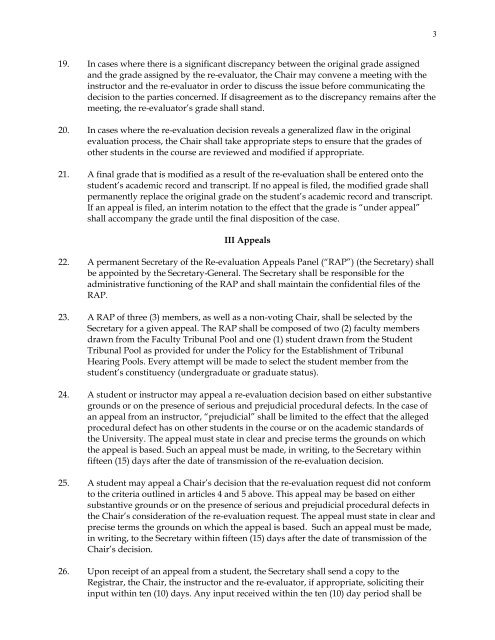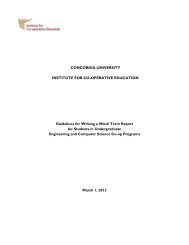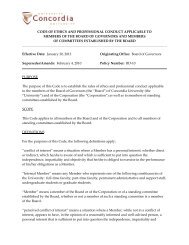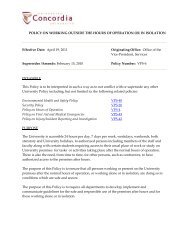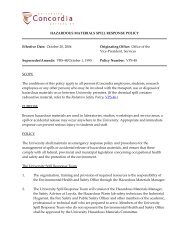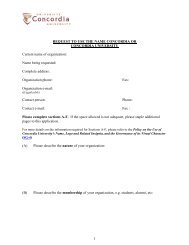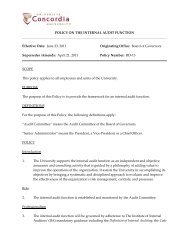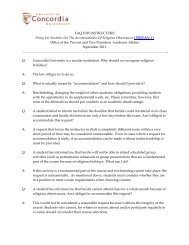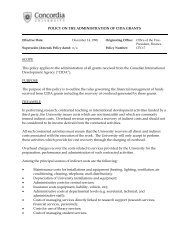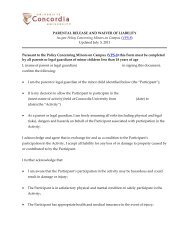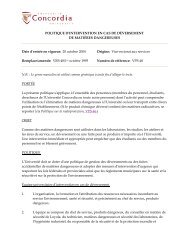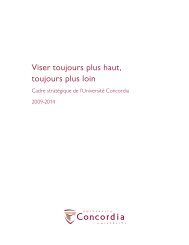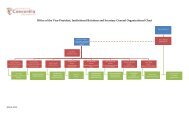Academic Re-evaluation Procedures - Concordia University
Academic Re-evaluation Procedures - Concordia University
Academic Re-evaluation Procedures - Concordia University
- No tags were found...
You also want an ePaper? Increase the reach of your titles
YUMPU automatically turns print PDFs into web optimized ePapers that Google loves.
319. In cases where there is a significant discrepancy between the original grade assignedand the grade assigned by the re-evaluator, the Chair may convene a meeting with theinstructor and the re-evaluator in order to discuss the issue before communicating thedecision to the parties concerned. If disagreement as to the discrepancy remains after themeeting, the re-evaluator’s grade shall stand.20. In cases where the re-<strong>evaluation</strong> decision reveals a generalized flaw in the original<strong>evaluation</strong> process, the Chair shall take appropriate steps to ensure that the grades ofother students in the course are reviewed and modified if appropriate.21. A final grade that is modified as a result of the re-<strong>evaluation</strong> shall be entered onto thestudent’s academic record and transcript. If no appeal is filed, the modified grade shallpermanently replace the original grade on the student’s academic record and transcript.If an appeal is filed, an interim notation to the effect that the grade is “under appeal”shall accompany the grade until the final disposition of the case.III Appeals22. A permanent Secretary of the <strong>Re</strong>-<strong>evaluation</strong> Appeals Panel (“RAP”) (the Secretary) shallbe appointed by the Secretary-General. The Secretary shall be responsible for theadministrative functioning of the RAP and shall maintain the confidential files of theRAP.23. A RAP of three (3) members, as well as a non-voting Chair, shall be selected by theSecretary for a given appeal. The RAP shall be composed of two (2) faculty membersdrawn from the Faculty Tribunal Pool and one (1) student drawn from the StudentTribunal Pool as provided for under the Policy for the Establishment of TribunalHearing Pools. Every attempt will be made to select the student member from thestudent’s constituency (undergraduate or graduate status).24. A student or instructor may appeal a re-<strong>evaluation</strong> decision based on either substantivegrounds or on the presence of serious and prejudicial procedural defects. In the case ofan appeal from an instructor, “prejudicial” shall be limited to the effect that the allegedprocedural defect has on other students in the course or on the academic standards ofthe <strong>University</strong>. The appeal must state in clear and precise terms the grounds on whichthe appeal is based. Such an appeal must be made, in writing, to the Secretary withinfifteen (15) days after the date of transmission of the re-<strong>evaluation</strong> decision.25. A student may appeal a Chair’s decision that the re-<strong>evaluation</strong> request did not conformto the criteria outlined in articles 4 and 5 above. This appeal may be based on eithersubstantive grounds or on the presence of serious and prejudicial procedural defects inthe Chair’s consideration of the re-<strong>evaluation</strong> request. The appeal must state in clear andprecise terms the grounds on which the appeal is based. Such an appeal must be made,in writing, to the Secretary within fifteen (15) days after the date of transmission of theChair’s decision.26. Upon receipt of an appeal from a student, the Secretary shall send a copy to the<strong>Re</strong>gistrar, the Chair, the instructor and the re-evaluator, if appropriate, soliciting theirinput within ten (10) days. Any input received within the ten (10) day period shall be


